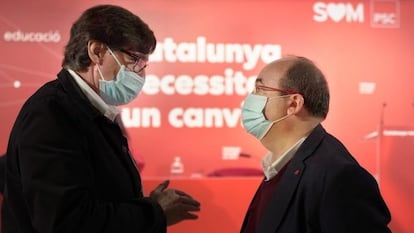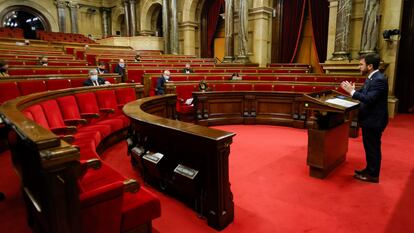Catalan election date uncertainty adds fuel to coronavirus, political crises
Health Minister Salvador Illa expected to quit in order to campaign despite not knowing if there will be a vote on February 14 or not
Catalonia is facing a regional election on February 14 without knowing if there will actually be a vote that day. A legal challenge against the regional government’s recent decision to postpone voting until May 30 means that the final date will remain unclear for days to come. Catalan officials say the postponement is due to the coronavirus health crisis, but the central government suspects electoral calculations: surveys show the Socialist Party (PSOE) candidate rivaling with separatist nominees in voter intention.
Catalonia’s regional High Court (TSJC) this week upheld the original decree calling elections for February 14, and voiding the Catalan government’s postponement. But a final ruling could come as late as February 8 – just six days before voters are asked to go to the polls. Until the definitive decision is in, campaign preparations must resume regardless.
The regional government says that the court’s decision “forces Catalans to choose between the right to health and the right to vote”
The regional executive, which said it had pushed back the date for public health reasons amid a third wave of the coronavirus, says that the court’s decision “forces Catalans to choose between the right to health and the right to vote.”
According to the Catalan government’s technical reports, the occupation of intensive care beds in the region is due to peak three days before the February election date, and the around 200,000 people estimated to be quarantining or self-isolating around that time would have trouble voting.
Catalonia’s acting premier, Pere Aragonès of the Catalan Republican Left (ERC), said on Wednesday that the court’s actions are affecting the election campaign. Both governing partners, ERC and Junts per Catalunya (Together for Catalonia), view this judicial decision as the latest example of the courts “meddling in Catalonia’s political and institutional life.”
If the court ultimately supports the May 30 postponement, public resources will have been wasted on the February campaign. Ismael Peña-López, the government official in charge of electoral processes, said that €25 million in expenses are at risk. This regional election will prove more expensive than others, since an additional €8 million is already being spent on coronavirus prevention measures.
Health concerns vs political calculations

In a rare agreement between separatist and conservative parties, the postponement has been backed by all political groups in the regional parliament except for the Catalan Socialists (PSC) – the Catalan branch of the PSOE – who insist on preserving the February date. A recent poll by the state-funded Center for Sociology Studies (CIS) shows a technical tie between the PSC and ERC at the election.
Spain’s central government, headed by a center-left coalition of the PSOE and Unidas Podemos, has expressed its own preference for February 14. Prime Minister Pedro Sánchez of the PSOE weighed in on Wednesday, stating that “Catalonia has a great opportunity for recovery, but it needs a fully functional government as soon as possible.”
Catalonia has been under an acting premier since late September, when the Spanish Supreme Court upheld an 18-month ban from public office against Quim Torra in connection with violations of institutional neutrality during an earlier election campaign.
The central government feels that the Catalan executive’s decision to postpone the election until May is not so much a reaction to the public health crisis as to the fact that Health Minister Salvador Illa plans to run as the Socialist candidate to the Catalan premiership – and that early surveys showed him in a potential tie with ERC and Together for Catalonia.
Miquel Iceta, secretary of the PSC, said that Illa will step down as health minister before Thursday of next week in order to focus on the campaign. The minister has drawn heavy criticism from other political parties for running as a candidate in the middle of a public health crisis.
Technical tie

According to a voter survey released on Thursday by CIS, the Catalan Socialists under Illa would win the February 14 election with 23.9% of the vote, securing 30 to 35 seats in the regional parliament. The second most-voted party would be ERC with 20.6% and 31 to 33 seats in the 135-strong house. Next would be Together for Catalonia with 20 to 27 seats, significantly down from the 34 the party currently holds.
These figures could potentially deliver a blow to the separatist bloc, which also includes the far-left CUP and is currently represented by 70 lawmakers. If an election were held on February 14, the bloc could obtain anywhere between 59 to 71 seats, according to the CIS poll.
The survey also indicates that the far-right Vox party could enter the Catalan parliament for the first time with six to 10 seats, possibly outperforming the conservative Popular Party (PP). The big loser of the election would be Ciudadanos (Citizens), an anti-independence party that won the most votes at the December 2017 election but was unable to form a government. Its 36 lawmakers could be reduced to 13 or 15, while the leftist En Comú Podem would secure nine to 12 seats, up from eight.
The survey also shows that voter sentiment towards the candidates favors the Socialist nominee Illa, with an average score of 5 ahead of Laura Borràs of Together for Catalonia (4.6) and Pere Aragonès of ERC (4.6).
National repercussions
The Catalan election affects more than just the northeastern region. Politicians across Spain were anxiously awaiting a poll that would give way to nearly two whole election-less years in a country that, since 2015, has been through four national elections, a European vote, regional and municipal polls, and two no-confidence motions in parliament.
This long period of rest was meant to facilitate cross-party deals on long-unresolved issues such as judicial reform. It was also hoped that the reduced political tension would benefit relations within the governing coalition of PSOE and Unidas Podemos, and even temper the battle for right-wing supremacy between the PP and Vox.
One of the Spanish government’s top goals for this term, besides getting a budget passed after years of gridlock, was to deal with the Catalan independence crisis. A regular dialogue with ERC, placed on hold until after February 14, is now postponed until an unknown date. And a decision on government pardons for jailed leaders of the 2017 unilateral secession attempt might now have to be taken before the election, adding layers of political complexity to an already sensitive issue.
The Catalan election campaign may even be causing internal tension within Spain’s governing coalition. The PSOE suspects that Unidas Podemos’ recent positions on certain issues may be influenced by its desire for its Catalan branch, En Comú Podem, to do well at the polls. The leftist party insists that its stand on pension and labor reform is a result of its beliefs, not an electoral calculation.
With reporting by Carlos E. Cué, José Marcos, Inés Santaeulalia, Jesús García, Camilo S. Baquero and Reyes Rincón.
English version by Susana Urra.
Tu suscripción se está usando en otro dispositivo
¿Quieres añadir otro usuario a tu suscripción?
Si continúas leyendo en este dispositivo, no se podrá leer en el otro.
FlechaTu suscripción se está usando en otro dispositivo y solo puedes acceder a EL PAÍS desde un dispositivo a la vez.
Si quieres compartir tu cuenta, cambia tu suscripción a la modalidad Premium, así podrás añadir otro usuario. Cada uno accederá con su propia cuenta de email, lo que os permitirá personalizar vuestra experiencia en EL PAÍS.
¿Tienes una suscripción de empresa? Accede aquí para contratar más cuentas.
En el caso de no saber quién está usando tu cuenta, te recomendamos cambiar tu contraseña aquí.
Si decides continuar compartiendo tu cuenta, este mensaje se mostrará en tu dispositivo y en el de la otra persona que está usando tu cuenta de forma indefinida, afectando a tu experiencia de lectura. Puedes consultar aquí los términos y condiciones de la suscripción digital.








































